| Srl | Item |
| 1 |
ID:
172090
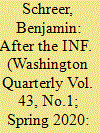

|
|
|
| 2 |
ID:
057645
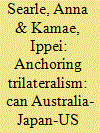

|
|
|
| 3 |
ID:
111040
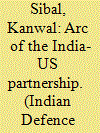

|
|
|
| 4 |
ID:
186363
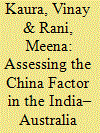

|
|
|
|
|
| Summary/Abstract |
The article argues that India and Australia have a significant role to play amidst China’s expanding maritime footprint in the Indian Ocean and growing influence in the South China Sea. With worsening relations between India and China as well as Australia and China, both New Delhi and Canberra have been deepening their connections, particularly after the COVID-19 pandemic. The article explores China as a key point of interest in India–Australia maritime cooperation and concludes that India–Australia ties have opened up the possibilities for expanding the arc of India’s strategic partnerships in the Indo-Pacific region..
|
|
|
|
|
|
|
|
|
|
|
|
|
|
|
|
| 5 |
ID:
159556
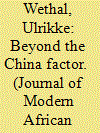

|
|
|
|
|
| Summary/Abstract |
China has become a significant contributor to closing Africa's infrastructural gap, but Chinese companies are repeatedly criticised for not involving local businesses in their operations, and for isolating themselves from the socio-economic environment. Can this be attributed to ‘typical Chinese business practice’? This article employs linkage theory to examine the weak domestic backward linkages in Chinese-led construction projects in Mozambique. The analysis shows that while Chinese companies do not involve Mozambican businesses in their activities to any extent, this cannot be attributed solely to any ‘Chinese business model’. It is a consequence of weak local industrial capabilities, fragile social infrastructure and a liberal policy environment not conducive to the creation of domestic backward linkages in Chinese-led construction projects.
|
|
|
|
|
|
|
|
|
|
|
|
|
|
|
|
| 6 |
ID:
063156
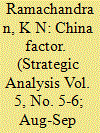

|
|
|
|
|
| Publication |
Aug-Sep 1981.
|
|
|
|
|
|
|
|
|
|
|
|
|
|
|
|
| 7 |
ID:
156080
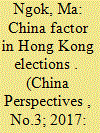

|
|
|
|
|
| Summary/Abstract |
The China factor has always been a significant structural, ideological, and organisational factor in Hong Kong elections. Since 2003, the deepening of intervention by Beijing and its Liaison Office in Hong Kong meant that the China factor as an organisational force became increasingly salient in elections. It also drove more people, especially young people, to resist China’s control and take the road of supporting independence or self-determination. The 2016 elections showed more ostensible intervention by the Liaison Office, and independence became a new campaign issue. The China factor will continue to be an integral part of Hong Kong elections in years to come.
|
|
|
|
|
|
|
|
|
|
|
|
|
|
|
|
| 8 |
ID:
131587
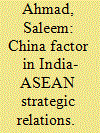

|
|
|
|
|
| Publication |
2014.
|
| Summary/Abstract |
As far as the China factor is concerned, India's policy toward Southeast Asia is influenced by this assumption that if China is strong in terms of economic interaction with Southeast Asia, India has a clear edge in the strategic arena. It is obvious that one of the reasons why ASEAN is keen to bring India into the regional affairs is the concern with China. It needs to be underlined that there are at present no signs of rivalry or competition for influence between India and China in Southeast Asia. It is hoped that Southeast Asia is a large enough region and the multilateral institutions are strong enough to accommodate the interests of great powers so that the region will not become a battleground for influence. Neither India nor ASEAN wants to create the impression that India's involvement in Southeast Asia is because of China.
|
|
|
|
|
|
|
|
|
|
|
|
|
|
|
|
| 9 |
ID:
176158
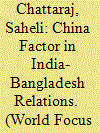

|
|
|
|
|
| Summary/Abstract |
The South Asian region is one of the least economically integrated regions in the world. Intra-regional trade remains well below its potential due to high transport costs, protectionist policies, and political tensions. The South Asian Association for Regional Cooperation (SAARC) agreements, the South Asian Preferential Trading Arrangement, and the South Asian Free Trade Arrangement, have failed to break down trade barriers.
|
|
|
|
|
|
|
|
|
|
|
|
|
|
|
|
| 10 |
ID:
110327
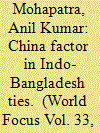

|
|
|
| 11 |
ID:
176155
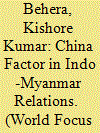

|
|
|
|
|
| Summary/Abstract |
Indo-Myanmar relations are marked by both paranoia and bonhomie because of a number of factors. Truly speaking, Myanmar is strategically important for India, especially in achieving its main goals of Look-East Policy launched under the P.V. Narasimha Rao-led Congress government to connect the Indian economy with the flourishing economy of neighbouring South East Asia. But, Prime Minister Narendra Modi’s Act East policy launched in 2014 aimed to counter growing Chinese influence and to gain more influence and connectivity with ASEAN states and beyond.
|
|
|
|
|
|
|
|
|
|
|
|
|
|
|
|
| 12 |
ID:
173495
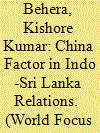

|
|
|
|
|
| Summary/Abstract |
Although in recent years, the relationship between India and Sri Lanka has been marked by frequent and close contact at the highest political level, growing trade and investment, cooperation in the fields of education, culture, and defence, as well as a broad understanding on the major issues of international interest, but Sri Lanka’s relations with China are better because its use of String of Pearls strategy in Sri Lanka is frequent.
|
|
|
|
|
|
|
|
|
|
|
|
|
|
|
|
| 13 |
ID:
173503
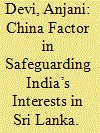

|
|
|
|
|
| Summary/Abstract |
India-Sri Lanka shares more than 2500 years old cultural ties. The religion of Buddhism has travelled to Sri Lanka only through India. However, the discriminative policy followed by the Sinhalese majority towards Tamil ethnic minorities disturbed the long sharing cultural relations of two countries. In the final stage of civil war, many Tamil minorities severely affected which made them more vulnerable.
|
|
|
|
|
|
|
|
|
|
|
|
|
|
|
|
| 14 |
ID:
156081
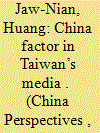

|
|
|
|
|
| Summary/Abstract |
To investigate how the Chinese government extends its influence to manipulate extra-jurisdictional media, this case study investigates Taiwan’s experience. It suggests that as Taiwanese media companies become embedded in the Chinese capital, advertising, and circulation markets, the Chinese authorities increase their ability to co-opt them with various economic incentives and threats, leading to self-censorship and biased news in favour of China. Using process tracing as the principal method, and archives, interviews, and secondary literature as principal data sources, the study supports the transferability of the “commercialisation of censorship” beyond China. Liberal states around China must design institutions protecting the media from inappropriate intervention by both domestic and foreign political and economic forces.
|
|
|
|
|
|
|
|
|
|
|
|
|
|
|
|
| 15 |
ID:
148431
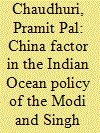

|
|
|
| 16 |
ID:
057894
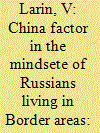

|
|
|
|
|
| Publication |
Jul-Sep 2004.
|
|
|
|
|
|
|
|
|
|
|
|
|
|
|
|
| 17 |
ID:
052728
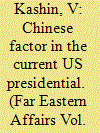

|
|
|
|
|
| Publication |
Apr-Jun 2004.
|
|
|
|
|
|
|
|
|
|
|
|
|
|
|
|
| 18 |
ID:
132599
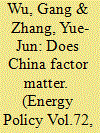

|
|
|
|
|
| Publication |
2014.
|
| Summary/Abstract |
Whether China's crude oil imports are the culprit of oil price volatility these years has not been quantitatively confirmed. Therefore, this paper empirically investigates the role of China's crude oil net imports in Brent price changes from October 2005 to November 2013 based on an econometric analysis. The results indicate that, during the sample period, China's crude oil imports do not significantly affect Brent price changes, no matter in the long run or short run. Therefore, the blame for China's crude oil imports to cause the dramatic fluctuations of international oil price has no solid evidence. Also, there exists significant uni-directional causality running from the Brent price to China×s crude oil imports at the 5% level. Besides, the response of the Brent price to China×s crude oil imports is found positive but slight, and the Brent price responds more significantly to US dollar exchange rate and OECD commercial inventory than to China's crude oil imports in the short run. Finally, the contribution of China×s crude oil imports to Brent price movement is about 10%, which is less than that of US dollar exchange rate but larger than that of Indian crude oil imports or OECD commercial inventory.
|
|
|
|
|
|
|
|
|
|
|
|
|
|
|
|
| 19 |
ID:
176408
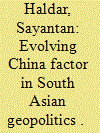

|
|
|
| 20 |
ID:
058126
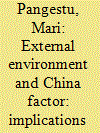

|
|
|